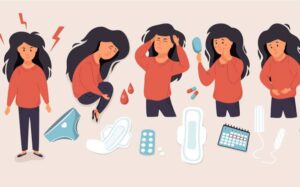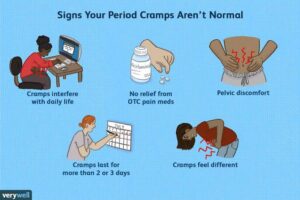Natural Solutions for Menstrual Cramps and PMS Symptoms
Throughout their periods of menstruation, many women experience premenstrual syndrome (PMS) symptoms and menstrual cramps. Natural medicines can provide excellent alternatives without the negative effects to over-the-counter painkillers, which are frequently used for comfort.
Women may find relief, encourage balance, and empower their general well-being by adopting comprehensive strategies and incorporating particular medicines, lifestyle modifications, and self-care practises.

In this post, we’ll look at several all-natural ways to relieve menstrual cramps and control PMS symptoms.
Understanding Menstrual Cramps
The painful contractions in the uterus during menstruation is the reason for menstrual cramps or dysmenorrhea. It can range from experiencing a mild discomfort to severe pain. Different people experience it differently according to their body type.
Some times menstrual cramps accompanied by headaches nausea and lower back pain. The primary cause of menstrual cramps is the release of prostaglandins a hormone-like substances that trigger uterine contractions.
However, several natural remedies can help alleviate these cramps and improve the overall menstrual experience.
Natural Remedies to alleviate menstrual cramps

1. Herbal Allies
Certain herbs possess anti-inflammatory and antispasmodic properties that can help ease menstrual cramps. Examples include cramp bark, ginger, chamomile, and turmeric. These herbs can be consumed as teas, supplements, or incorporated into meals.
2. Heat Therapy
Applying a heating pad or warm compress to the lower abdomen can provide soothing relief and relax tense muscles. Warm baths with essential oils like lavender or clary sage can also be beneficial.
3. Exercise and Stretching
Engaging in gentle exercises like yoga, walking, or swimming can promote blood circulation, reduce cramps, and alleviate PMS symptoms.
4. Dietary Adjustments
Consuming a balanced diet rich in fruits, vegetables, whole grains, and lean proteins can support hormonal balance. Limiting caffeine, alcohol, and processed foods may also help reduce inflammation and cramps.
Managing PMS Symptoms Naturally

Balancing Hormons
Certain herbs like chasteberry, evening primrose oil, and black cohosh can help regulate hormone levels and ease PMS symptoms. Consulting with a healthcare professional or herbalist is advised before starting herbal supplements.
Practice Relaxation Techniques
Practices such as meditation, deep breathing exercises, and aromatherapy can help manage stress and emotional symptoms associated with PMS.
Take Adequate Nutritional Support
Incorporating foods rich in omega-3 fatty acids, calcium, and magnesium can help reduce bloating, mood swings, and fatigue. Examples include fatty fish, leafy greens, nuts, and seeds.
Take Enough Rest and Sleep
Prioritizing sufficient sleep and relaxation can contribute to overall well-being and help manage PMS symptoms effectively.



